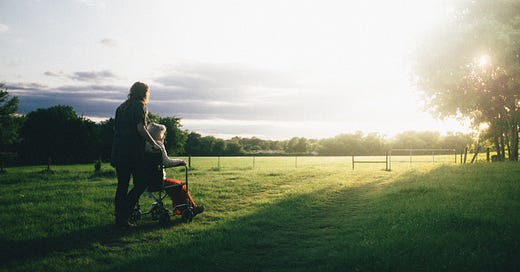Photo by Dominik Lange from Unsplashed
Hey there everyone,
I’m still on the road. These reflections are a bit loose because I haven’t had much time to gather them into a structured whole. I’m sending them along anyway, because I am imagining there are many of you reading or listening who are in this same space, and because there may be a roomier quality to these thoughts.
I’m hoping the unfinished nature of today’s post will inspire you to write some comments back, to share your own thoughts on this issue, which is so immense, so unwieldy, that I’m just touching down today, to share.
I’m sitting at the kitchen table with my father. In a month he’ll turn 87. I’ve come to visit and help him around the house. Today he tells me he wants me to clean out his closets because his suits don’t fit him anymore.
I go upstairs and cover his bed with old towels, to protect the bedspread. My father is tall, even though he’s shrinking because his lumbar discs are degenerating. I stand on my tiptoes to pull the suit jackets from their hangers on the top bar. The jackets are thick wool, herringbone, stripes, or finely-grained grey, black, and navy.
There are patches of dust on the lapels, the pockets, and across the shoulders. It’s a soft, spongey, light brown powder, born of unopened closets. Some of the jackets and pants are still in plastic bags from the dry cleaners. I pull the suits in groups of three or four, folding and stacking them in piles. I layer the dusty jackets and the dry cleaned suits on top of each other. I load the stacks into trash bags and lug them down the four flights of stairs.
The work is tangible, useful, routine, a cousin of forms of care work like tending the needs of infants, or people with dementia. There’s something about this kind of mundane work that acts on me like a sedative. I can’t find myself, can’t locate a feeling, or a thought, other than the next task ahead of me.
My father is downstairs, drinking coffee, and I’m loading his old suits into garbage bags as if I’m readying for an estate sale. I should be feeling grief, or nostalgia, or some kind of wistful something. Instead, my mind is vacant.
I move on to the other tasks, my hands busy sorting magazines, throwing out old holiday cards, bits of ribbon, unfinished kitting projects. I try to connect energetically to all the other people who are performing this kind of task right now, in other houses, in storage bins, at Goodwill pickup lines. I try to feel what they’re feeling. I wonder if I’m weird for being blank.
I think of the people, mostly women, who looked after my mother in the years she was in end-stage Alzheimer’s at a care facility. How patient they were, how bad-ass—staring death in the face, day after day, and then going home to their own children, families, that second circle of need, their intimate world, pushing up and competing with the needs of people like my mother.
I think of the people caring for newborns and toddlers. Feed, clean, bathe, laundry, feed, clean again. Laboring at the same tasks, over and over, until the last load of dishes is done. How the clean kitchen, with its single lamp, shining a pool of light down on the counter, makes it seem like nothing happened, nothing was accomplished.
They say care work is invisible labor. We see it only in its absence, when things fall apart.
I’ve been thinking about care in this concrete sense. But I’ve also been wondering if this form of care is so consuming, so exhausting, that to ask people who are doing it to care about anything other than these immediate needs is too much, or cruel, or just unrealistic.
I don’t know how to balance my awareness of the staggering work of care giving with the fact that we need so many more people to be engaged in the work of transforming our culture, in contesting violence and oppression, in innovating and leading the way to a world that looks so different from the one we’re currently inhabiting.
As much as there is a gap between those with money and status and those who are just getting by, there’s a chasm between those who are holding us all together, in our animal bodies, in our emotional needs, and those who operate at a level of abstraction and remove, better compensated, more respected, able to believe they’re independent and self-sufficient, because they are so out of touch with what it takes to keep people alive.
It’s the ones who are holding us all together who have the wisdom and the empathy and the practices that will make it across the threshold from this world to the one that’s coming if we are to survive; it’s these people who know how to hold power in a way that’s different from the way power is conceived of and enacted by the dominant culture.
When I think about the urgent need to fight and undermine white supremacy, or to help people shift their behavior to respond for climate change, it seems to me inseparable from the need to expand our arena of care, to include people and non-human species in our sphere of responsibility, in our emotional world, even if it requires us to feel more grief, confusion, and pain than we are already carrying.
Though I am currently caring for my father, in a few days I will get on a plane, go back home, walk into my office and sit down. I’m not one of the people who are daily caring for others, for years on end. I can’t claim the radical empathy being practiced by so many who are caring for our most vulnerable, our most fragile.
I want to make my “self” bigger, to include in my ethic of care the needs of those who are beyond my current spheres of influence. I want to become porous enough to feel and act upon my responsibility to strangers. How can I better know what to do, when I witness the photographs of people in foreign countries, wading through floods?
Is the practice of daily caregiving a bridge to global compassion? When we see and meet the needs of the vulnerable in front of us, will we no longer countenance the suffering of strangers?
Or is caregiving so time consuming, so underpaid, so under resourced, that it’s one reason so many who want to make a difference cannot engage in advocacy, activism, or work for social change?
People who are engaged in caregiving are immersed in a world of daily, necessary tasks. They are already generous. They know empathy. They know sacrifice. I worry about these people, many of whom are women, not having room and space for self. I wonder if it’s ethical to ask people who are already working so hard to expand their scope of responsibility beyond what they’re already doing.
It is those who are socialized to seek power, to strive for status, to expect to have their needs met by others who often struggle with empathy and to soften the boundaries of the self. Patriarchy compounds the problem, shaming men who are “soft,” who are actively working to be in tune with their compassion and grief.
White supremacy sickens white folks, teaches us that care work is the province of those who are not white, that the work of tending the body should be less compensated than the work that focuses on the mind. It ridicules and condemns the very qualities we most need in order to transform our culture, creates circles of care and interdependency.
How do we re-socialize the elite and powerful to become part of community, to become generous, to conserve resources for the whole, rather than hoard them for the few?
How do we lift the burdens of those who are overworking in the arena of care?
How do we become a “feminized” society—one that lauds and respects caring and empathy and that is full of people who are unafraid of facing death, of acknowledging our frailty, our uncertainty, our physical and emotional pain? If we better shared the work of caregiving, would this shift in our priorities diminish the power of patriarchy and white supremacy to shape our world?













Share this post